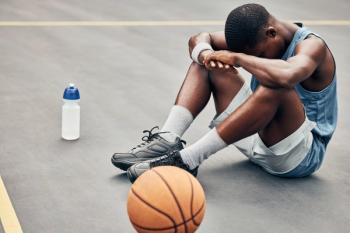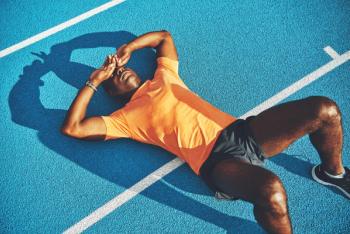
Top 3 Studies on Athletes' Mental Health From Around the Globe: Insights from Q1 2025
Key Takeaways
- Proactive mental health care in sports enhances performance and reduces stigma, encouraging early athlete engagement and resilience building.
- Mobile app usage among athletes can impact mental health, with problematic use linked to stress, anxiety, and poor performance.
SECTION EDITOR’S PICK
The first quarter of 2025 brought a range of important global research in sports psychiatry, with studies offering critical insights into evolving approaches to athlete mental health and performance. Here are 3 studies you should know, why they matter, and a clinical pearl from each.
1. Promoting Mental Health for Optimal Performance in Sports
- Study: Schorb A, Häfelinger U, Pesicka M, et al.
Promoting mental health for optimal performance in sports. Sports Psychiatry. 2025;1-6. - Summary: This article argues that mental health care in competitive sports should not only focus on treating disorders but also proactively promote mental wellness to enhance performance. It highlights that many athletes only seek help when their performance drops—and by that point, symptoms are often advanced. Early interventions, routine mental health screenings, and framing mental health support as performance optimization (not just illness care) could make athletes more receptive and reduce stigma.
- Why It Matters: Framing care to improve mental wellness as an agent for enhancing performance,shifts the view from “fixing broken athletes” to “building mental health proactively to boost performance,” which can engage athletes earlier, strengthen resilience, and reduce overall mental health burden. Burden refers to the negative impacts and costs associated with mental health conditions, including the individual’s experiences, societal consequences, and economic implications across their career span. It is important to recognize that mental illness places a strain not only on the individual experiencing it, but also on families, communities, and health care systems.
- Clinical Pearl: Frame mental health interventions as part of performance enhancement, not just as treatment for problems, when discussing services with athletes. This positioning lowers stigma and increases early engagement.
2. Mobile App Use and the Mental Health of Elite Athletes
- Study: Collins R, Yang R, D’Souza BN, et al.
Mobile app use and the mental health of elite athletes. Sports Psychiatry. 2025;1-8. - Summary: This systematic review looked at how mobile apps impact elite athletes' mental health and performance. The findings show a complex relationship: while some apps (like mindfulness or resilience apps) have potential mental health benefits, no significant positive performance outcomes were confirmed. On the flip side, problematic mobile app use—especially social media and constant smartphone engagement—was strongly linked to increased stress, anxiety, poor sleep, and mental fatigue, all of which undermine athletic performance.
- Why It Matters: Athletes often use apps for self-improvement and connection, but unmanaged app use can quietly erode sleep, focus, and emotional stability, ultimately damaging athletic and mental performance.
- Clinical Pearl: Screen athletes not just for general screen time but specifically for app type and usage patterns. Encourage mindful app use and set boundaries around apps that worsen sleep, anxiety, or self-comparison.
3. Sport Psychiatry in the Asia-Pacific: Contributions, Trends, and Future Directions
- Study: Kassim MAM, Kamu A, Pang NTP, Ho CM.
Sport psychiatry in the Asia-Pacific: contributions, trends, and future directions. Sports Psychiatry. 2025;1-10. - Summary: This article uses a bibliometric analysis to map the research landscape of sport psychiatry in the Asia-Pacific region. Findings reveal that Australia has emerged as the leading hub for research collaborations, with additional contributions from Europe and North America. Current research often explores how cultural factors like collectivism vs individualism influence athletes' motivations and mental health presentations. Although awareness and specialized clinics are growing, challenges such as stigma, limited formal training pathways, and the need for cultural adaptation remain. The authors call for more intra-regional collaboration, culturally tailored mental health tools, and region-specific training programs to advance the field.
- Why It Matters: As sport psychiatry expands globally, it is essential to recognize that approaches effective in Western countries may not translate seamlessly elsewhere. Cultural differences shape how athletes experience, report, and seek help for mental health challenges. There is a strong need for culturally-specific screening tools andincreased intra-regional research collaboration (not just with Europe/North America). Building culturally sensitive frameworks and expanding regional research capacity will be critical for meaningful, sustainable growth, and signifies emerging opportunities to contribute to capacity-building in underrepresented regions.
- Clinical Pearl: When working with international or multicultural athlete populations, tailor assessments and interventions to fit cultural attitudes toward mental health, stigma, and help-seeking behaviors.A culturally competent approach improves trust, engagement, and outcomes.
Across these studies, a common thread emerges: Early identification of mental health needs—whether influenced by performance pressures, digital habits, or cultural context—is key to supporting athlete well-being and success. Proactive, personalized approaches to mental health are essential. Tools that help individuals recognize their unique patterns of stress and resilience can play a powerful role in strengthening both mental health and performance, on and off the field.
Stay tuned each quarter for the latest insights shaping the future of sports psychiatry.
Dr Wilsa Charles Malveaux is a sports psychiatrist in Los Angeles, California, and CEO of WCM Sports Psych. She is an advocate and educator on the intersection of mental health, sports, and racial and social justice. Dr Charles Malveaux lends her expertise as a psychiatric consultant to multiple national sport-related agencies, professional sports teams, and organizations. She served for over 4 years as the Western Regional Trustee (region 4) on the Board of Black Psychiatrists of America. Dr Charles Malveaux now serves on the Board of Directors for the American Board of Sports and Performance Psychiatry (ABSPP), as well as on advisory boards for organizations serving the community. She is the Sports Psychiatry Section Editor for Psychiatric Times.
Newsletter
Receive trusted psychiatric news, expert analysis, and clinical insights — subscribe today to support your practice and your patients.







